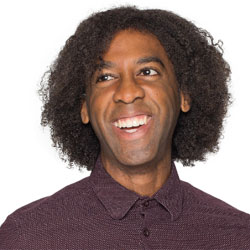Were we twins earlier
we might have saved the other from learning to speak,
to speak dead, to speak dead romance, to speak dead romance
languages. Utter embouchure. The aftertaste of hurt knots the tongue,
an unripe persimmon. An echo tumbles from the mountain range
of a French horn, hunt long finished, rabbits interrupted
by bullets. Then skinned. Then opened wide. There is no translation
for rescue save breath. How we speak to and only to each other.
By the routine of lung. After years of half-formed, airtight Hebrew
the lonely heart’s grammar relaxes, allows one vowel. U.
Notes on the Poem
In the poem "Idioglossia" from his 2013 Griffin Poetry Prize shortlisted collection Personals, Ian Williams nimbly circles then zeroes in with devastating precision on a type of language about which most of us might not know, or might be pointedly prevented from knowing. That mysterious language is both alluring and dangerous. Dictionary definitions of the term idioglossia cover everything from the charming "a private form of speech invented by one child or by children who are in close contact, as twins" to the alarming "a pathological condition characterized by speech so distorted as to be unintelligible." Williams' poem ranges from the whimsy of "to speak dead, to speak dead romance, to speak dead romance languages" to abrupt and violent imagery. This parenting article about idioglossia strikes notes of concerns about letting twins linger too long in the tantalizing realm of their own private discourse, to the detriment of their development and socialization. So, when Williams opens his consideration of idioglossia (also known by the more treacherous-sounding "cryptophasia", with which we're grateful Williams did not choose to title the poem) with: "Were we twins earlier we might have saved the other from learning to speak" he's posing some notions that demand pondering. "Were we twins earlier" indicates that the duo understood in this poem didn't start out as twins ... so how did they become twins or twinned beings? Further, "we might have saved" suggests, contrary to that parenting article, that developing speech or the ability to communicate outside this very small circle isn't necessarily desirable. Ian Williams captures intriguingly the compelling but potentially perilous intimacy of a private language or code shared with only one other.
